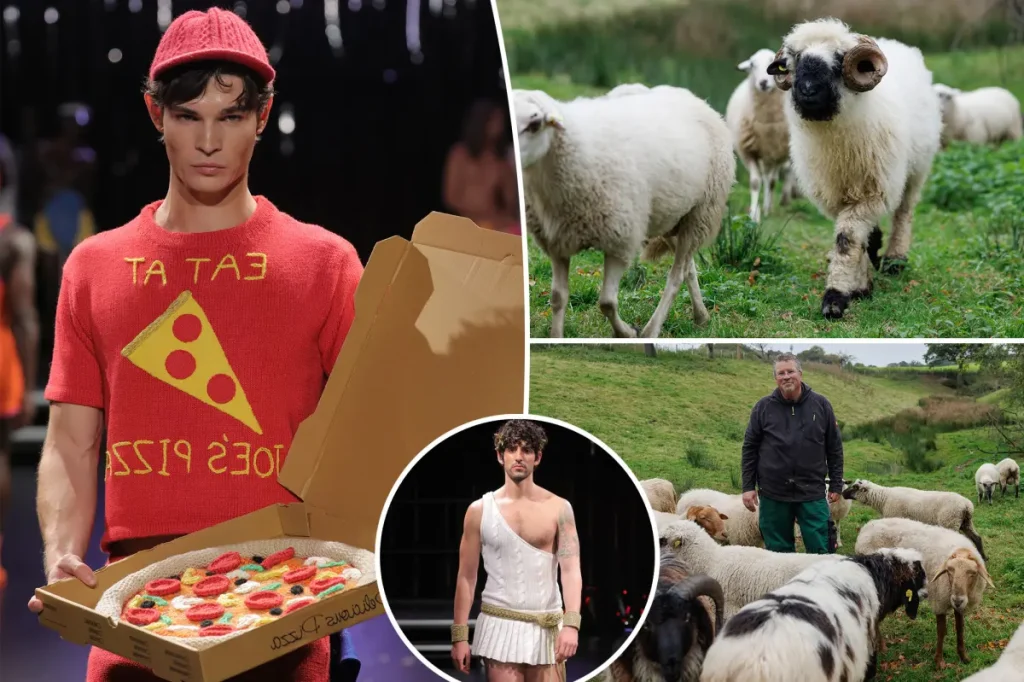Embracing Diversity: The Intersection of Fashion, Nature, and LGBTQ+ Rights
In a groundbreaking fusion of fashion, animal welfare, and LGBTQ+ advocacy, designer Michael Schmidt has introduced a revolutionary knitwear collection that challenges conventional thinking about both the fashion industry and natural sexuality. Debuting in mid-November at Manhattan’s Altman Building, Schmidt’s aptly named “I Wool Survive” collection features garments crafted from wool sourced from what’s being called the “first flock of gay sheep” in Germany. This innovative project emerged from a troubling agricultural practice: the culling of rams that show no interest in mating with ewes. Schmidt’s collection transforms this controversial practice into a platform for discussion about both animal rights and human sexuality, highlighting how diversity exists naturally throughout the animal kingdom.
The science behind the collection reveals fascinating insights about animal sexuality that many people may not be aware of. Scientists estimate that approximately 8% of rams demonstrate sexual preference for other males, a statistic that inspired Michael Stücke to establish Rainbow Wool, a non-profit organization dedicated to rescuing non-mating sheep and utilizing their wool. This partnership between Schmidt, Rainbow Wool, and the LGBTQ+ dating app Grindr has resulted in a 36-piece collection that transcends traditional fashion boundaries. Schmidt himself, who has worked with iconic celebrities like Madonna, Taylor Swift, and Cher, emphasizes that this project is not merely about fashion but represents something deeper: “It’s an animal rights story. And it’s a human rights story.” His perspective frames the collection not as conventional fashion but as an artistic expression promoting a powerful message about natural diversity.
At its core, “I Wool Survive” challenges the notion that homosexuality is unnatural or a choice. Schmidt articulates this clearly: “The idea it’s selling is that homosexuality is not only part of the human condition, but of the animal world. That puts the lie to this concept that being gay is a choice. It’s part of nature.” This sentiment is echoed by Tristan Pineiro, senior vice president for brand marketing and communications at Grindr, who pointedly observed, “You can’t say the sheep were corrupted by woke culture.” The collection’s various pieces, from polos to shorts to robes, deliberately “reimagine gay identity” and will be auctioned to benefit LGBTQ+ causes, creating a direct link between the artistic expression and tangible support for the community it celebrates.
Schmidt’s approach to the collection was intentionally bold and celebratory, as he expressed a desire to “really lean into the gay” aspect of the project. This unapologetic embrace of LGBTQ+ identity resonates with Pineiro’s observation that the collaboration serves as “a metaphor for how gay people are treated across the world.” The parallel between the potentially discarded sheep and marginalized LGBTQ+ individuals creates a powerful narrative about resilience and community. As Pineiro elaborated in an official statement: “Rainbow Wool’s story mirrors the experience of so many LGBTQ+ people, cast aside for being different, yet thriving through community. Together, we’re proving that connection can transform exclusion into celebratory expression.” This framing elevates the collection beyond mere clothing to a symbol of solidarity and transformation.
The significance of this project extends beyond its artistic and advocacy dimensions to challenge fundamental assumptions about nature and sexuality. Michael Stücke of Rainbow Wool emphasized that the collection “proves that being gay is part of nature itself,” adding that “the wool from these rams isn’t just material, it’s a message spun from animals who live freely and are loved.” This perspective invites viewers and consumers to reconsider deeply held beliefs about what constitutes natural behavior, using a tangible product—clothing—to make an abstract point about acceptance and diversity. By highlighting how these rams’ natural tendencies would have led to their culling in conventional farming, the project raises important questions about how societies value conformity and what price is paid when diversity is rejected.
“I Wool Survive” represents a fascinating intersection of fashion, science, animal welfare, and human rights advocacy. The collection challenges multiple boundaries simultaneously—between art and commerce, between animal and human rights, between nature and culture. By transforming wool from sheep that might otherwise have been culled into high-fashion garments celebrating diversity, Schmidt has created a powerful statement about acceptance that resonates across multiple domains. The project invites us to consider how often prejudice is justified by appeals to what is “natural,” while demonstrating that nature itself contains far more diversity than such arguments acknowledge. Through this thoughtful approach to fashion as advocacy, Schmidt, Rainbow Wool, and Grindr have created something that transcends clothing—a wearable conversation about how we understand both the natural world and our place within it.














